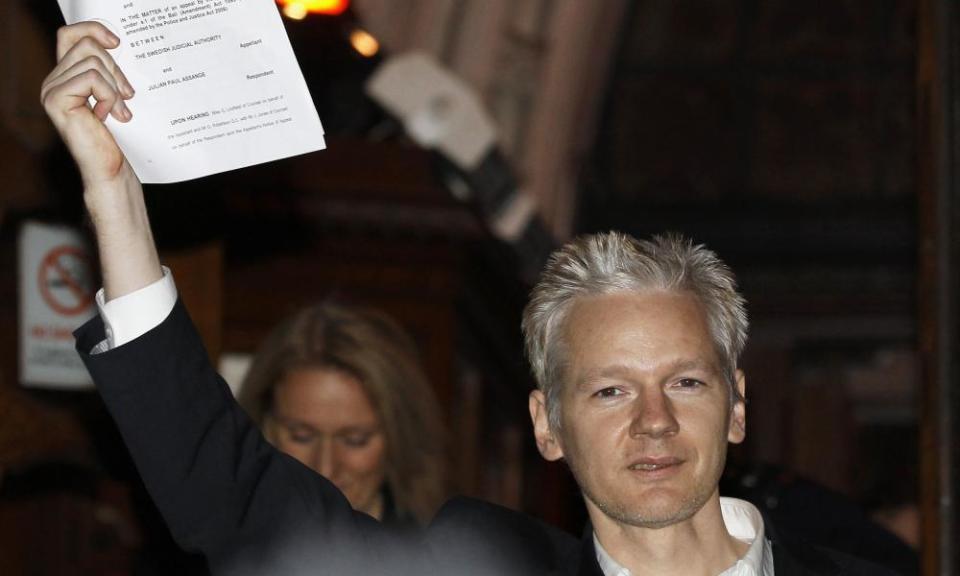From hatred to love to cold indifference: Trump's changing tune on WikiLeaks

When Donald Trump was in Ohio, he declared: “Boy, I love reading WikiLeaks.” In Michigan, he proclaimed: “This WikiLeaks is like a treasure trove.” In Pennsylvania, he confessed: “WikiLeaks, I love WikiLeaks.”
It was the run-up to the 2016 presidential election and Trump was WikiLeaks’ number one salesman. But on Thursday, with the website’s founder Julian Assange under arrest, the US president was singing a different tune. “I know nothing about WikiLeaks,” Trump said. “It’s not my thing.”
The jarring shift illustrated, critics say, the shameless opportunism and hypocrisy of president. Whether it hints at anything about his alleged links to Russia remains altogether murkier.
Related: Julian Assange faces US extradition after arrest at Ecuadorian embassy
Matthew Miller, former director of public affairs at the justice department, said: “His ethics have always been situational at best so I’m not surprised he’s out disclaiming any knowledge. He has no concern about the broader ethics of any situation, only what’s best for him. It’s pretty simple, really.”
Looking disheveled with pony tail and long beard, Assange, 47, was hauled out of the Ecuadorian embassy in London on Thursday after taking refuge there for nearly seven years. He is facing extradition to the US for conspiring with Chelsea Manning, a former army intelligence analyst turned whistleblower, to break a password for a classified government computer in 2010.
This was long before Trump became president and, at first glance, the connection to him appears tenuous. The indictment against Assange was brought not by Special Counsel Robert Mueller but by prosecutors in Virginia and the justice department’s national security division.
Yet the justice department could still supplement their indictment with a new one containing more serious charges. Manning was imprisoned last month after she refused to testify about WikiLeaks before a grand jury in Virginia, implying that prosecutors’ work related to Assange is not complete.
He can clearly expect little sympathy from Trump, whose attitude towards WikiLeaks has evolved from hatred to love to cold indifference.
The anti-secrecy site was once lionised by the left for holding the American political establishment and military industrial complex up to the light. In 2010 it released, in cooperation with publications including the Guardian, more than a quarter of a million classified cables from American embassies around the world.
Back then, Republicans expressed fury at Assange. Trump himself said: “I think it’s disgraceful. I think it should be like death penalty or something.”

WikiLeaks founder Julian Assange in 2010Photograph: Stefan Wermuth/AP
Just six years later, it was a very different story. WikiLeaks came to be seen as a tool of the Trump election campaign as, with his explicit encouragement, it published emails from Democrats believed to have been stolen by Russian intelligence operatives.
In July 2016, a dump of Democratic National Committee material appeared designed to embarrass Hillary Clinton on the eve of the party convention. In October, emails hacked from Clinton’s campaign chairman, John Podesta, were published just minutes after the release of a video in which Trump was caught boasting about groping women.
Seizing the gift, candidate Trump cited WikiLeaks 141 times at 56 events, according to a count by NBC News. He was breezy and blase about how the hacked emails were obtained. A poster of Assange hung backstage at his debate war room, the Associated Press reported.
The relationship between the campaign and WikiLeaks – and indeed Russia – remains shrouded in mystery. Behind the scenes, Trump’s son, Donald Trump Jr, was in direct communication with WikiLeaks in the final stages of the 2016 campaign.
Roger Stone, a Trump confidante and self-declared “dirty trickster”, repeatedly boasted of connections to WikiLeaks and of having advance knowledge of the organisation’s publication plans. In January, Mueller indicted Stone on charges including obstruction of an official proceeding, witness tampering and making false statements. He has pleaded not guilty.
Stone was apparently in touch with his friend Jerome Corsi, a conservative activist and conspiracy theorist, about WikiLeaks during the final months of the campaign. Corsi has defended Stone, claiming that he was the source of a suspicious tweet from Stone in August 2016 predicting that it would soon be Podesta’s “time in the barrel”. Corsi predicted his own indictment by Mueller was but was spared.
As for Assange himself, he claimed to remain neutral in 2016. Asked by Democracy Now whether he wanted Clinton or Trump to win, he memorably replied: “You’re asking me, do I prefer cholera or gonorrhea?”
And once Trump won election, WikiLeaks quickly fell out of favour. The president told the Associated Press in 2017 that he did not “support or unsupport” its release of the hacked emails. Asked whether Assange should be arrested, he replied: “I am not involved in that decision, but if they want to do it, it’s OK with me.”
Last year further tantalising details emerged when an indictment against 12 Russians described WikiLeaks’ role in publishing the emails. While it said the site had worked to coordinate the release of information, there was no allegation that it solicited the hacking of Democratic email accounts or worked with Russians.
According to Attorney General William Barr, Mueller found no evidence of collusion between the Trump campaign and Moscow. But until Mueller’s full report is released, it is unclear what he found about WikiLeaks, its interactions with the campaign – or whether it could lead to further charges.
Miller said: “It’s certainly possible. We have no way of knowing if the US government has been able to obtain any evidence of Assange knowingly communicating with Russian intelligence agents.”

